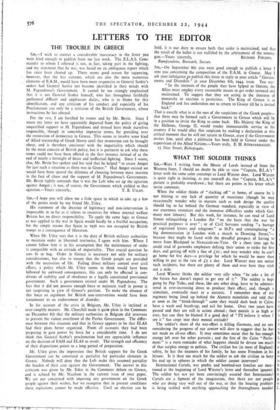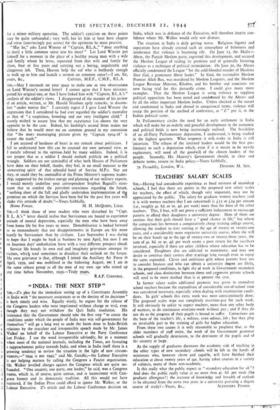WHAT THE SOLDIER THINKS
SIR,—Were I writing from the House of Lords instead of from the Western front, I should no doubt be able to view " Captain, B.L.A.'s " letter with the same calm contempt as Lord Winster does. Lord Winster is quite right in insisting, as you yourself do, that " Captain, B.L.A.'s" picture is probably overdrawn ; but there are points in his letter which invite comment.
When the soldier thinks of " slacking off " at home, of course he is not hinting at any lack of quantity of munitions (though he may occasionally wonder why in matters such as tank design the quality should lag so far behind the German standard, especially in view of our enormous resources and the immense difficulties under which Ger- many now labours). But this week, for instance, he can read of Lord Simon relinquishing a London flat " on the basis that the war for practical purposes is over " ; or of Civil Servants sending " a barrage of registered letters and telegrams " to M.P.s and contemplating ".a big demonstration in London with a march to Downing Street,"— because they might be faced with the dreadful prospect of having to move from Blackpool to Newcasde7on-Tyne. Or a short time ago he could read of gasworks employees defying their union to strike for five days, and getting off with a fine of Do ; and may wonder why he can't go home for five days—a privilege for which he would be more than willing to pay at the rate of £2 a day. Lord Winster may not notice such incidents, but there are plenty of them and over here they stick out a mile.
Lord Winster thinks the soldier very silly when "he asks a lot of the future but doesn't expect to get any of it." The soldier is kept going by Pep Talks, and these, like any other drug, have to be adminis- tered in ever-increasing doses to produce their effect, and, though a stimulant, eventually react as a narcotic. I remember inen of my regiment being lined up behind the Alamein minefields and told that as soon as the " break-through " came they would dash back to Cairo, have a wash and brush-up, and sail for home. Over two years have passed and they are still in action abroad ; their morale is as high as ever, but can they be blamed if a good deal of " believe it when I see it " has crept into their mental attitude?
The soldier's share of the war-effort is killing Germans, and no one considering the progress of our armies will dare to suggest that he has not made an all-out effort. It may sometimes occur that he has enetagh energy left over for other pursuits ; and the fate of the Cairo "Parlia- ment " is a stern reminder of what happens should he devote too much of that surplus energy to politics. The civilian has (in most of England) safety, he has the nearness of his family, he has some Freedom in his leisure. Is it then too much for the soldier to ask the civilian to keep his end up in spheres in which the soldier cannot intervene?
International Cartels, war profits and bombed-out families are men- tioned at the beginning of Lord Winster's letter and thereafter ignored. The soldier has not yet been convincingly assured that International Cartels are a figment of the imagination, that there are not people who are doing very well out of the war, or that the housing problem is being tackled with anything approaching the thoroughness needed a is tl tl tl ri a e ai is IV rr for a minor military operation. The soldier's cynicism on these points may be quite unfounded ; very well, but let him at least have chapter and verse (convincingly put across) for the optimism he must practise.
"Has be," asks Lord Winster of "Captain, B.L.A.," " done anything to instil a little common sense into his men? " Let Lord Winster put himself for a moment in the place of a healthy young man with a wife and family whom he loves, separated from that wife and family for three, four or five years and carrying out a boring, unpalatable and dangerous job. Then, Heaven help the oaf who is foolhardy enough to walk up to him and launch a sermon on common sense!—I am, Sir,



























 Previous page
Previous page